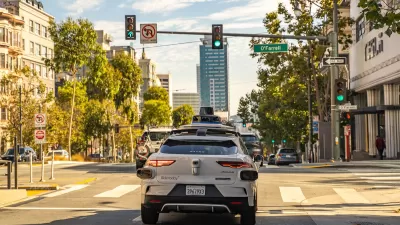General Motors recently cancelled development of "Defensive Driving" software in its autonomous vehicle program. The announcement came just days after Ford announced it had cancelled the development of similar "Safe Driving" software.

It's still unclear whether self-driving cars will reduce traffic, but the doesn't mean they'll ever have to reduce their speeds.
Two major automakers have announced the demise of software development programs that would have forced self-driving cars and other autonomous vehicles to put safety first on the roads this week.
On Tuesday, Ford announced that it would no longer develop "Safe Driving" software for its self-driving car program. Earlier press announcements described Safe Driving software as "basically the golden rule behind the wheel," and promised that self-driving cars would always perform like they were driving on the streets of their childhood.
"We found that most consumers have no desire for their future self-driving cars to drive like their grandmothers," said Vern Periculosus in an email response to questions. "We also found that most engineers don't want to build a car to drive like their grandmothers."
Bipartisan conflict followed the announcement, with Democrats raising concerns about the thousands on layoffs among wealthy donors in the Silicon Valley, and Republicans accusing the program of being a "democratic ploy to make cars the new plastic straws."
The Ford announcement scarcely had time to settle in on Capital Hill before GM followed with its own announcement of layoffs and plans to build a more aggressive, potentially lethal self-driving cars. Earlier reviews of GM's now defunct "Defensive Driving" software, called the experience of riding in a GM self-driving car set to "Defensive Driving" like hearing "Summertime" by DJ Jazzy Jeff and the Fresh Prince for the first time.
Speed is a factor in one-third of all traffic fatalities, according to the Vision Zero Network. But in the future, software will be taking the risks instead of humans, according to the consequences of these announcements. When asked if the companies had any evidence that robots will make better choices than humans on the roads, Periculosus evaded.
The decision is based on precedent, according to Periculosus, because car companies could have locked engines to prevent cars from traveling at unreasonable and unsafe speeds for decades. "Consumers have always preferred speed over safety, and they always will," said Periculosus.
FULL STORY: GM: No Demand for 'Defensive Driving’ Mode in Self-Driving Cars

Montreal Mall to Become 6,000 Housing Units
Place Versailles will be transformed into a mixed-use complex over the next 25 years.

Planetizen Federal Action Tracker
A weekly monitor of how Trump’s orders and actions are impacting planners and planning in America.

DARTSpace Platform Streamlines Dallas TOD Application Process
The Dallas transit agency hopes a shorter permitting timeline will boost transit-oriented development around rail stations.

Trump's “Able Bodied” Public Housing Limits Could Displace Over 300,000 New Yorkers
As part of 43% cut to federal rental assistance, Trump is proposing a two-year limit on public housing tenure for “able bodied adults.”

Nine Ways to Use Curb Space That Aren’t Parking
California’s new daylighting law bans parking within 20 feet of crosswalks. How can cities best use this space?

ADUs for Sale? San Diego Could Legalize Backyard Condos
As one of 25 proposed amendments, San Diego may soon allow accessory dwelling units to be bought and sold as individual homes.
Urban Design for Planners 1: Software Tools
This six-course series explores essential urban design concepts using open source software and equips planners with the tools they need to participate fully in the urban design process.
Planning for Universal Design
Learn the tools for implementing Universal Design in planning regulations.
City of Mt Shasta
City of Camden Redevelopment Agency
City of Astoria
Transportation Research & Education Center (TREC) at Portland State University
City of Camden Redevelopment Agency
Municipality of Princeton (NJ)
Regional Transportation Commission of Southern Nevada





























